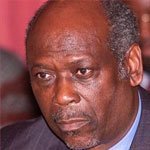
THE death of Higher and Tertiary Education minister, Stan Mudenge has reignited debate on why Zanu PF officials cling onto power until their death, instead of retiring when they are ill.
Report by Nqaba Matshazi
Mudenge had been ill for some time and at one stage was walking with the aid of a cane, yet President Robert Mugabe kept him at the helm of the ministry until his last breath.
He died in his room at a Masvingo hotel where he was due to deliver a speech.
Mudenge joins a long list of Zanu PF officials, who despite ill health have held onto power until their eventual death.
Zanu PF member and former Mavambo front man, retired Major Kudzai Mbudzi said the death of Mudenge in office was an indictment on the Zanu PF leaders who continued to cling onto power even though age or ill health had taken their toll.
“Mudenge has died without handing over the revolutionary baton to his revolutionary colleagues despite having had ample time to do so,” he said.
“Now in his death, we have to start the journey and process of trying to discover what exactly was the revolutionary strategy, which in the past 32 years, he had been trying to execute.”
- Chamisa under fire over US$120K donation
- Mavhunga puts DeMbare into Chibuku quarterfinals
- Pension funds bet on Cabora Bassa oilfields
- Councils defy govt fire tender directive
Keep Reading
Mbudzi said despite Mudenge being declared a national hero, this status was somewhat diluted by the failure to hand over the reins both in government and Zanu PF to a younger generation, who would then continue with the revolutionary ethos.
“Even if we have some questions that require his critical reflection, he can no longer respond to them,” he said.
Mbudzi said Zanu PF should not only seek to regenerate and look for a younger crop of leaders, but rather succession should a well-controlled, managed and deliberate process, acted out in ample time. “My colleagues in Zanu PF must also acknowledge the fact that people do not only rest-in-peace in death, but can in serenity also do so in ill health or old age,” he added.
This view was shared by academic Ibbo Mandaza, who together with Mudenge, were the first crop of senior civil servants at independence in 1980.
“He should have retired long ago and not die in office,” Mandaza opined.
Mandaza said Mudenge’s continued stay in power was a reflection of Mugabe’s style of management in government, where ministers stayed in power until they died.
Mugabe, who turns 89 next year, is reported to be ill but he has resisted calls to retire.
Some of the senior government officials who died after lengthy illnesses include Vice-Presidents Joshua Nkomo, Simon Muzenda and Joseph Msika. They all died in office.
Some of Mugabe’s ministers are reportedly ill, with some of them having spent months on sick beds in various hospitals.
However, both Mbudzi and Mandaza said they had had a cordial relationship with the late minister, whom they spoke glowingly of. Mudenge’s body was taken to his rural Zimuto home, where it lay in state last night. Today it will be taken to his Borrowdale home, ahead of burial at the National Heroes’ Acre tomorrow morning.











